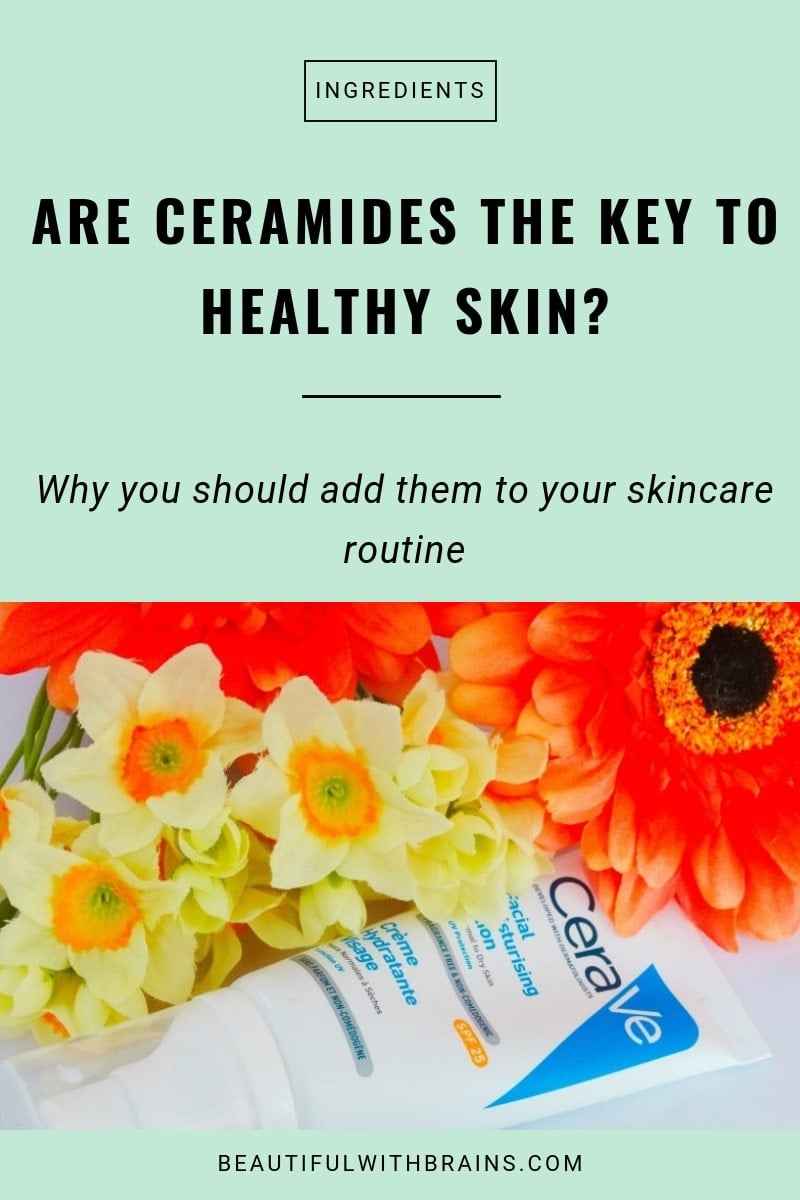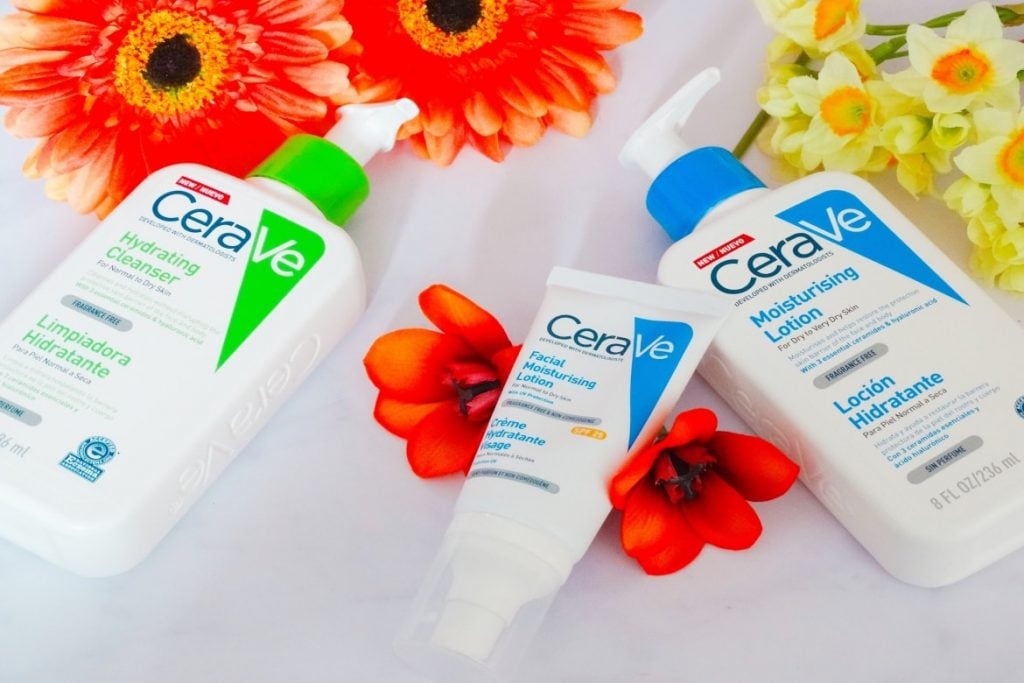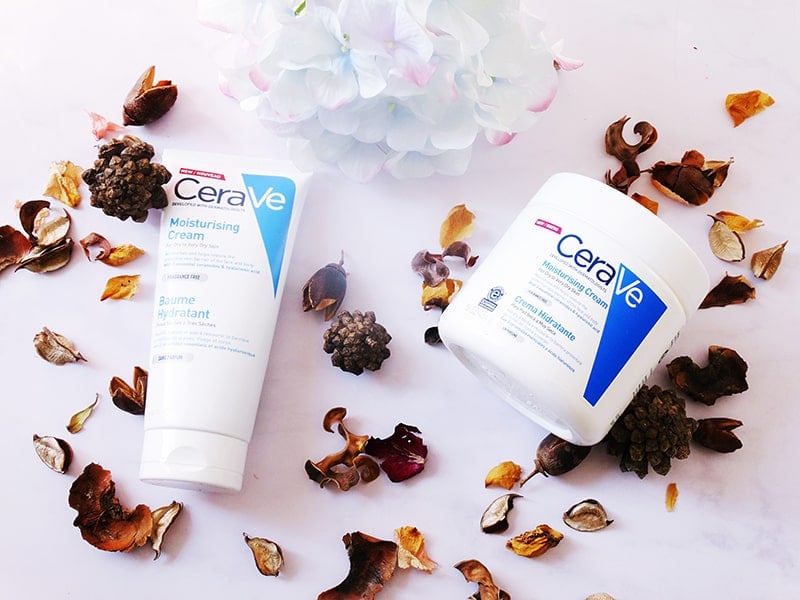
Wondering about the benefits of ceramides for skin? If they could talk, here’s what ceramides would say: “It’s typical, isn’t it? You work hard every single day to moisturise skin and no one pays any attention to you. None. Then, along come stem cells, peptides, and all those fancy new ingredients with exotic names and bam! instant limelight on them! And they don’t even work that well! SO unfair!”
Poor ceramides! They have a lot to get off their chests. For way too long, Elizabeth Arden and CeraVe were the only ones who cared about them. Now, they’re slowly finding their way into more and more creams and lotions. For a reason. Ceramides are the unsung hero of skincare. The workhorses that do the heavy lifting without the recognition. The moisturisers everyone should add to the skincare routine, pronto. Here’s why:
What Are Ceramides?
Unsung skincare heroes, ceramides are oily waxes (“cera” means wax in Latin) that make up the glue that holds skin cells together (together with fatty acids, cholesterol etc). “Ceramides are known to be part of this complex family of fats or lipids called a sphingolipid,” explains board-certified dermatologist Melissa Kanchanapoomi Levin, MD. Imagine your skin’s protective barrier as a wall made of bricks and mortars. Your skin cells are the bricks, while the fats in between (including ceramides) are the mortar that keeps them glued together. This barrier keeps moisture in, so your skin stays hydrated for longer, and protects your complexion from environmental aggressors and harsh irritants.
There are 9 types of ceramides.They’re all conveniently numbered (ex ceramide 1, ceramide 2, etc) to make our lives easier. Six of them are naturally found in your skin. But those you’ll find in your skincare products are all made in a lab. Then, there are phytoceramides. In nature, they’re derived from plants. In your cosmetics, they come from yeast – a lot less exciting, I know! But they work, so it’s all good.
While ceramides occur naturally in skin, they can also easily get depleted. “Seasonal changes with cold or hot temperatures can reduce the ceramides in your skin,” shares skincare expert Sarah Chapman. “Low levels of ceramides result in dehydrated, irritated skin and can even lead to more serious skin conditions such as atopic dermatitis.”
Struggling to put together a skincare routine that banishes dryness and makes your skin supple and dewy? Download your FREE “Best Skincare Routine For Dry Skin” to get started (it features product recommendations + right application order):

Benefits Of Ceramides For Skin
Ceramide strengthen and repair your skin’s protective barrier. Let’s look at what they do in more detail:
- Repair the skin’s protective barrier: Your skin’s protective barrier has two jobs. It keeps moisture in, so your skin stays hydrated for longer, and germs and irritants out. When this barrier is broken down, moisture evaporates through the cracks, drying out skin. Germs and other irritants can get in, irritating it. Ceramides come to the rescue. They repair the broken holes in this barrier, banishing dryness and soothing irritations.
- Hydrate skin: By strengthening/repairing your skin’s protective barrier, ceramides help to increase the levels of hydration in your skin, so that it stays soft and hydrated for longer. If it’s dry, it also helps to get it back to its soft and supple self.
- Protect skin: Your skin’s protective barrier is the first defence against environmental aggressors, like harsh winds, scorching heat, irritating skin care products, and anything else that wants to harm your skin. The stronger this barrier is, the more resilient your skin get. By adding ceramides to your skin regularly, you make sure this barrier stays as strong as possible.
- Help tolerate active ingredients: Active ingredients like retinol and glycolic acid can irritate and dry out skin, disrupting its protective barrier. Adding ceramides to the mix strengthens this barrier, so that your skin better tolerates these powerful anti-aging actives. Results? Your wrinkles look smaller without the irritation.
- Soothes eczema and irritations: “We know that ceramides are a missing component in people that have eczema, or clinically dry skin,” says Board-certified dermatologist Dr. Alexis Stephens. “Putting on moisturizer with ceramides greatly helps restore the outer layer of the skin.”
Do Ceramides Help Reduce Wrinkles?
While we’re talking about the skincare benefits of ceramides, let’s clear up a common misconception. Ceramides aren’t anti-aging AND they can help with wrinkles. Here’s what I mean. Ceramides don’t have antioxidant properties. They don’t fight free radicals or boost collagen, like retinol and antioxidants do. Instead, ceramides, like pretty much everything else, deplete with age. As they do, skin gets drier. The drier your skin is, the worse your wrinkles will look. By keeping skin hydrated, ceramides plump up your fine lines and wrinkles, so they look smaller to the naked eye.
How To Use Them
It really depends on what product you’re using. If it’s a serum, it goes between cleanser/exfoliant and moisturiser. If it’s a moisturiser, it’s the last step of your skincare routine. Either way, you’ll see results immediately. Hydration works instantly.
How Often Should You Use Them?
You can use ceramides up to twice a day, morning and evening.
Who Should Use Them?
This is the beauty of ceramides: everyone, regardless of their skin type, can use them. Dry skin? Super moisturising, they’ll banish dryness without turning your skin into a greasy mess. Oily, acne-prone skin? They keep your skin soft and smooth without adding more oil and aggravating acne. Sensitive skin? They moisturise and soothe skin without irritating it.
How To Make The Most Of Ceramides In Your Skincare Routine
Ceramides work. But, if you want to make the most out of them, you need to use them with their BFFs. You know, the other stuff that makes up your skin’s protective barrier. Studies show the best combo is ceramides (50%) with cholesterol (25%) and free fatty acids (15%). They form what scientists call “crystalline lamellar structures,” which have amazing moisture-retaining properties. You’ll still see benefits and smoother, softer skin if you use ceramides alone – but this combination does go the extra mile.
Ceramides VS Hyaluronic Acid: Which One Is Better?
Ceramides and hyaluronic acid both hydrate skin, but in different ways. Hyaluronic acid draws moisture from the air and binds it in. But, if the skin’s protective barrier is damaged, some of this moisture will evaporate out again. Ceramides strengthen the skin’s protective barrier, so the extra moisture stays in. It’s not about which one to use. For best results, you need both ceramides and hyaluronic acid in your skincare routine.
Side Effects Of Ceramides
Ceramides have no side effects. You’ve read that right. While it’s possible you’ll find the odd person allergic to ceramides (there are people who are allergic to plain old water, after all), ceramides are safe for 99.9% of people. Yay!
Do Ceramides Clog Pores?
No, ceramides do not clog pores. They’re super moisturising and make your skin soft and supple without adding more oil to it, clogging pores, and aggravating acne. They’re suitable for all skin types, including oily and acne-prone.

What Are The Best Products With Ceramides?
- CeraVe PM Facial Moisturizing Lotion ($20.00): My fave moisturiser for ALL skin types, it’s enriched with niacinamide and ceramide to strengthen the skin’s protective barrier and make skin softer and smoother. Available at Beauty Bay, Cult Beauty, Look Fantastic, and Ulta
- Drunk Elephant Lala Retro Whipped Cream ($62.00): A rich cream with ceramides and natural oils to make even the driest skin types soft and smooth again. Only suitable for dry skin. Available at Cult Beauty, Sephora, SpaceNK and Ulta.
- Elizabeth Arden Retinol Ceramide Capsules Line Erasing Night Serum ($54.00): Retinol fights wrinkles, prevents new ones from forming, and fades away dark spots – but it can be irritating. These capsules use ceramides to moisturise skin and strengthen your skin’s protective barrier, so you can better tolerate retinol. Result? Softer, younger-looking skin. Available at Elizabeth Arden and Ulta.
- Paula’s Choice Clinical Ceramide-Enriched Firming Moisturiser ($63.00): An anti-aging moisturiser enriched with medium-strength retinol and Vitamin C to fight wrinkles and prevent premature aging. Ceramides moisturise skin, counteracting their drying effects. Even so, use it only every other day. Available at Cult Beauty, Net-A-Porter, and Paula’s Choice.
- Paula’s Choice Omega+ Complex Moisturizer ($37.00): My fave moisturiser for sensitive, dry skin, it’s packaged with ceramides, fatty acids, and natural oils that can make even the driest of skin types soft and supple again in a matter of days. It’s super gentle too. Available at Cult Beauty, Paula’s Choice, and Sephora.
- Skinceuticals Triple Lipid Restore 2:4:2 ($150.00): I know this is expensive for a moisturiser with no anti-aging powers, but it deserves a special mention because it contains the right ratio of ceramides, cholesterol, and free fatty acids to moisturise skin and get better results. Available at Dermstore, Look Fantastic, and Skinceuticals.
- Tula Tri-Supreme Serum Overnight Oil Concentrate ($74.00): An oil-based formula with ceramides and natural oils to moisturise and antioxidants to prevent wrinkles. Ideal for dry and sensitive skin. Available at Tula and Ulta.
The Bottom Line
Ceramides are those reliable friends you always take for granted, yet are always there for you. They strengthen your skin’s protective barrier, keeps skin hydrated for longer, soothe irritations, and protect it from environmental aggressors. Pay them more attention and your skin will never crack again.


My body lotion has ceramides in it. I’m not sure about any facial products, I should find out! I can’t believe I don’t know.
Janessa,ceramides are so underrated! Even the brand themselves rarely promote them so you never know if they’re in something until you look for them carefully.
Thanks for another informative article!
Vivella, my pleasure!
Awesome post! I really believe skin-identical ingredients like these help skin so much! Paula’s choice is great ‘ey, I love her formulations, they are all packed with stuff that will work!
http://www.honestyforyourskin.co.uk
Cheryl, I agree. Fancy ingredients get all the attention, but skin-identical ones do most of the work to keep our skin healthy.
I adore Paula’s Choice. It’s my favourite line. Finally a brand that uses ingredients that really work, not just those that are popular.
Wow, so glad I stumbled across this article, even if it’s old.
I have a question: What can you say about Elizabeth Arden’s Advanced Time Complex Capsules? Do they have the right ingredient concentration? Thank you so much!
Rosa, I’m a fan. Usually you don’t need that much ceramide for it to work.
Is it already in the skin care routine you recommend for dry skin? If not, how do you add it with all the other stuff – retinol, hyaluronic acid, niainimide?